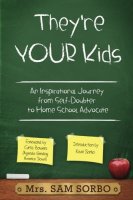 They're Your Kids: An Inspirational Journey from Self-Doubter to Home School Advocate by Sam Sorbo (Reveille Press, 2016)
They're Your Kids: An Inspirational Journey from Self-Doubter to Home School Advocate by Sam Sorbo (Reveille Press, 2016)
I usually ignore the suggestions my Kindle pops up for me to read, but I'm a sucker for homeschooling stories, especially at $2.99. This one both pleased me and was woefully disappointing.
The pleasure came in the second part of the book, which describes the family's experience with homeschooling. I love these personal tales, whether the author shares my own educational philosophies or not. Homeschooling stories are infinitely varied and, to me, endlessly interesting. The Sorbos' adventures are no exception.
The disappointment came, as disappointment usually does, through foiled expectations.
I had read that the inspiration for the family to begin homeschooling came because the parents' careers (acting, modelling, writing) took them on the road a lot. "Aha," I thought. This could be the solution to a problem that has been troubling me.
Because we were homeschoolers before that educational option became popular—indeed, before it became legal in many states—my lovingly amassed collection of homeschooling stories is very old. Not that anyone's personal experiences can really become outdated, but I know that those currently homeschooling or considering the option would like to hear voices from the current century.
Moreover, while homeschooling was initially primarily a left-wing, "hippie" kind of movement, it was later enthusiastically adopted by Christians who had their own reasons for distrusting government schools, and many of the more recent stories have an unabashedly religious base. Nothing wrong with that—but it muddles the issues in some people's minds.
Knowing that They're Your Kids was from a family of traditionally secular, left-wing professions, I anticipated that it would provide a much-needed, different perspective.
It doesn't. Far from it. The beginning of the book is filled with the kind of anti-public-school ranting that the more secular folks associate with right-wing extremism, and which embarrasses so many of us who still consider ourselves both Christian and politically more right than left. Especially painful is that the author, like so many others, fails to distinguish the Common Core standards from some of the highly objectionable implementations. It's the kind of diatribe that may pump up those who already agree, but will turn off nearly everyone else.
Despite all this, I certainly don't regret buying They're Your Kids. It costs more than $2.99 to buy a bag of chips! What I'd recommend is skipping over the first part of the book and getting right into the Sorbos' story. Every homeschooler's story has a unique perspective and new ideas
I do have one more warning; it's for my readers who are trying to teach multiple levels and wrangle toddlers at the same time: Just ignore the part where she says her three kids get everything done in three hours. (We only had two and never finished in three hours.)
Herewith some of my favorite quotes:
“No one can become really educated without having pursued some study in which he took no interest - for it is part of education to learn to interest ourselves in subjects for which we have no aptitude.” — T. S. Eliot
As good a job as the educators [at the Classical Christian school] were doing, I realized Shane was no longer at liberty to pursue his mathematics to his heart’s content. Now he was on a treadmill, along with his entire class.
I realized that teachers are, in fact, traffic control cops, and so my son was simply good at being herded. “What about his academics?”
“He’s doing fine...”
“Fine” was an unacceptable accolade, when I’d seen him love learning at home.
[Schools] adopt a plan that levels the expectations, by slowing down the better performers. Although this approach may seem counter-intuitive, it’s much easier to hold back the advanced students than try to accelerate the less gifted ones.
If revered institutions don’t complete the textbooks, why was I holding myself to such a high standard? Because I’m a perfectionist… but that’s unhealthy for my kids and me. I decided that just because I have high standards doesn’t mean I must follow and complete an entire curriculum to find educational satisfaction.
Keep your eye on the ball. Learning is the goal, the textbook is just a tool.
[A]t the risk of losing them to boredom or frustration, I err on the side of caution—everything in moderation. We cover the basics until I see they understand, confident that review is coming. This way, the loves of my life aren’t burdened with my obsessive perfectionism, agonizing to complete tomes of structured learning. I’d rather we concentrate on enjoying the process instead.
Early in life I’d learned to choose the hard thing, because boredom was worse than hard work.
Sometimes, you have to do something that’s hard simply because it is hard—to practice, to build strength.


